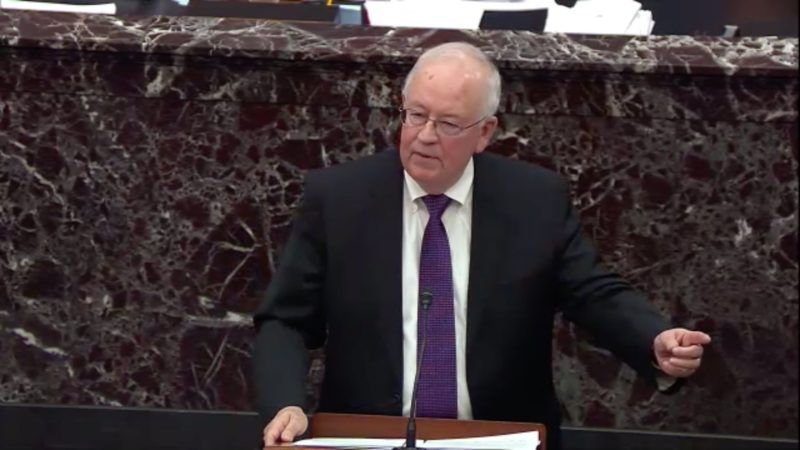To Defend Trump, Ken Starr Invokes Martin Luther King
Starr urges senators to follow King's example and uphold "freedom and justice."

One of President Donald Trump's lawyers invoked Martin Luther King Jr.'s "I have a dream" speech in Trump's Senate impeachment trial today, accusing the House of failing to follow the rules and urging the Senate to reject all charges on the grounds that the U.S. stands for "freedom and justice."
"The nation is about freedom," said Ken Starr, the ex-independent counsel whose report led to the impeachment of former President Bill Clinton. "And we hear the voice of Martin Luther King Jr. and his dream-filled speech about freedom, echoing the great passages inscribed on America's temple of justice, the Lincoln Memorial, which stood behind Dr. King as he spoke on that historic day."
But King's words weren't just about freedom, Starr continued. They were also about justice. "In his speeches, [King] summoned up regularly the words of a Unitarian abolitionist from the prior century, Theodore Parker, who referred to the moral arc of the universe"—an arc that "points toward justice."
That justice, according to Starr, must be borne out by authenticity, which is only made possible by strict adherence to the rules. "It's why we don't allow deflated footballs," he said, a reference to the NFL's "Deflategate" scandal, "or stealing signs from the field," alluding to the Houston Astros controversy.
In that vein, Starr argued that the House should be "called to account" for its alleged failure to ensure "fundamental fairness" throughout Trump's Senate trial. "Did the House Judiciary Committee rush to judgement in fashioning the articles of impeachment?" he asked.
Starr noted one rule he claimed was broken: House Republicans did not receive a full day to call witnesses during Trump's initial impeachment inquiry, alluding to Clause 2(j)(1) of House Rule XI. "Whenever a hearing is conducted by a committee on a measure or matter," it states, "the minority members of the committee shall be entitled, upon request to the chairman by a majority of them before the completion of the hearing, to call witnesses selected by the minority to testify with respect to that measure or matter during at least one day of hearing thereon."
Did Democrats in fact break that rule? Not so, says Casey Burgat of the R Street Institute. "It's not an entire day, and majority still gets to decide when, who, and where, and can even dilute minority chosen witnesses by naming 1 (or 100) of their own," he told CNN a few weeks ago. "Plus, rules say the witnesses and testimony have to be relevant."
While House Republicans did not receive a full day dedicated to their witnesses, they did indeed call several individuals to testify during the impeachment inquiry. Among them were Kurt Volker, Tim Morrison, David Hale, and Jonathan Turley. Democrats rejected their pleas to have Hunter Biden and the whistleblower testify, but Burgat says that House rules permit this.
Starr also made mention of precedent set in trials past. "Are we to countenance violations of the rules and traditional procedures that have been followed scrupulously in prior impeachment proceedings?" he asked. But no two impeachment trials are the same; the process is more like a game of Calvinball where lawmakers make up the rules as they go along. Senate Majority Leader Mitch McConnell (R–Ky.) strayed from his assurance that Trump's proceedings would follow the Clinton impeachment model. Would Starr object to that?


Show Comments (25)